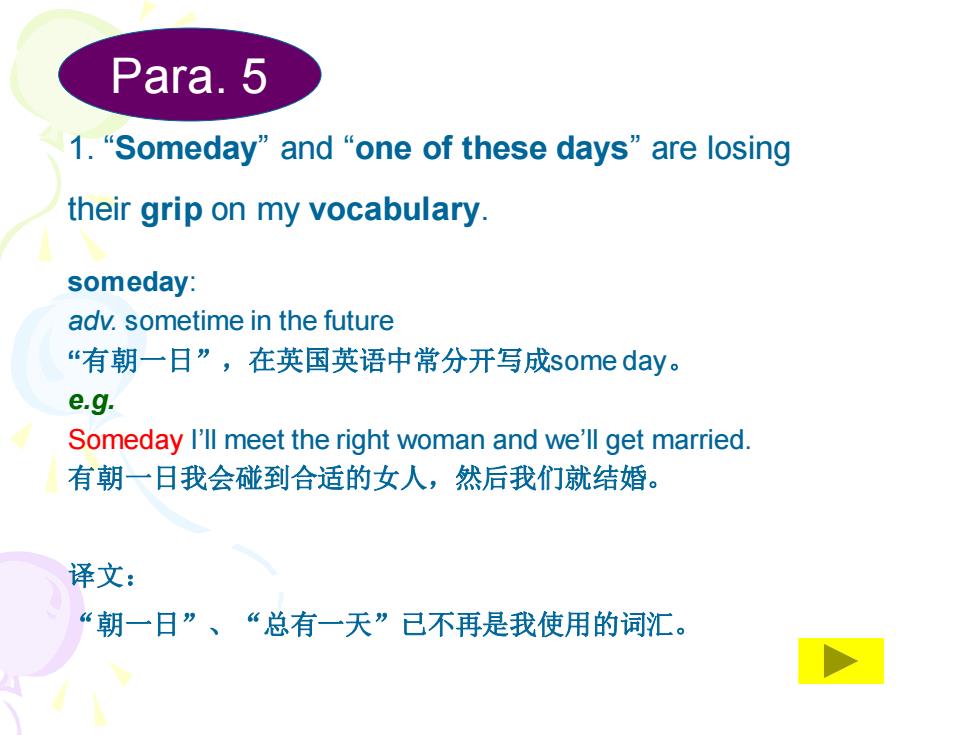
Para.5 1.“Someday"and“one of these days”are losing their grip on my vocabulary. someday: adv.sometime in the future “有朝一日”,在英国英语中常分开写成some day。 e.g. Someday I'll meet the right woman and we'll get married. 有朝一日我会碰到合适的女人,然后我们就结婚。 译文: “朝一日”、“总有一天”已不再是我使用的词汇
1. “Someday” and “one of these days” are losing their grip on my vocabulary. Para. 5 someday: adv. sometime in the future “有朝一日”,在英国英语中常分开写成some day。 e.g. Someday I’ll meet the right woman and we’ll get married. 有朝一日我会碰到合适的女人,然后我们就结婚。 译文: “朝一日”、“总有一天”已不再是我使用的词汇
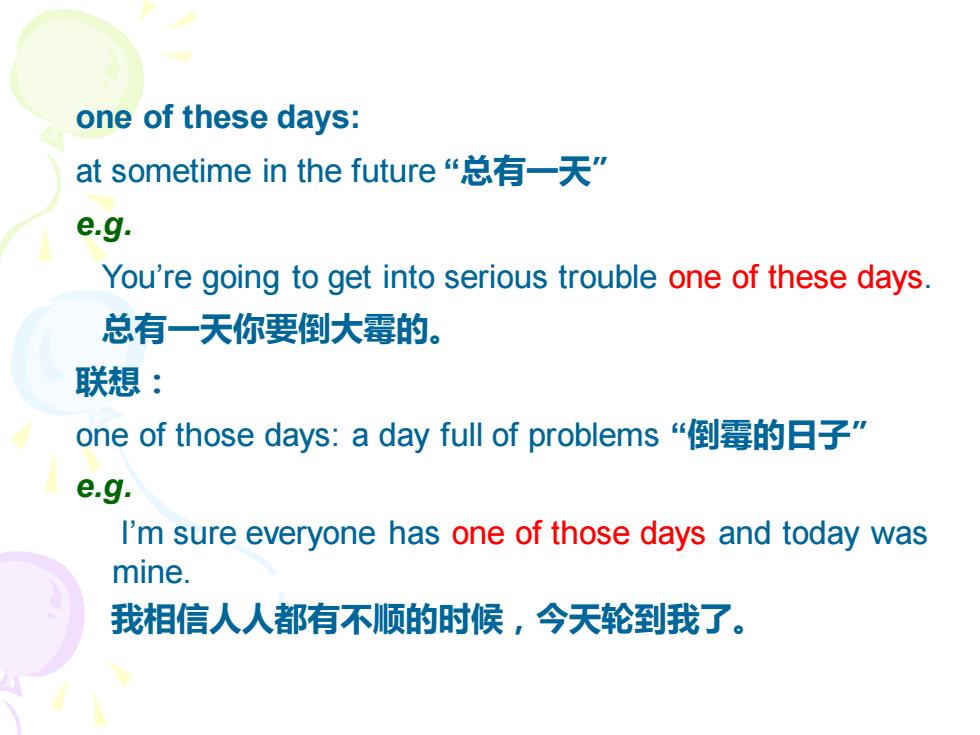
one of these days: at sometime in the future“总有一天' e.g. You're going to get into serious trouble one of these days. 总有一天你要倒大霉的。 联想: one of those days:a day full of problems“倒霉的日子” e.g. I'm sure everyone has one of those days and today was mine. 我相信人人都有不顺的时候,今天轮到我了
one of these days: at sometime in the future “总有一天” e.g. You’re going to get into serious trouble one of these days. 总有一天你要倒大霉的。 联想: one of those days: a day full of problems “倒霉的日子” e.g. I’m sure everyone has one of those days and today was mine. 我相信人人都有不顺的时候,今天轮到我了
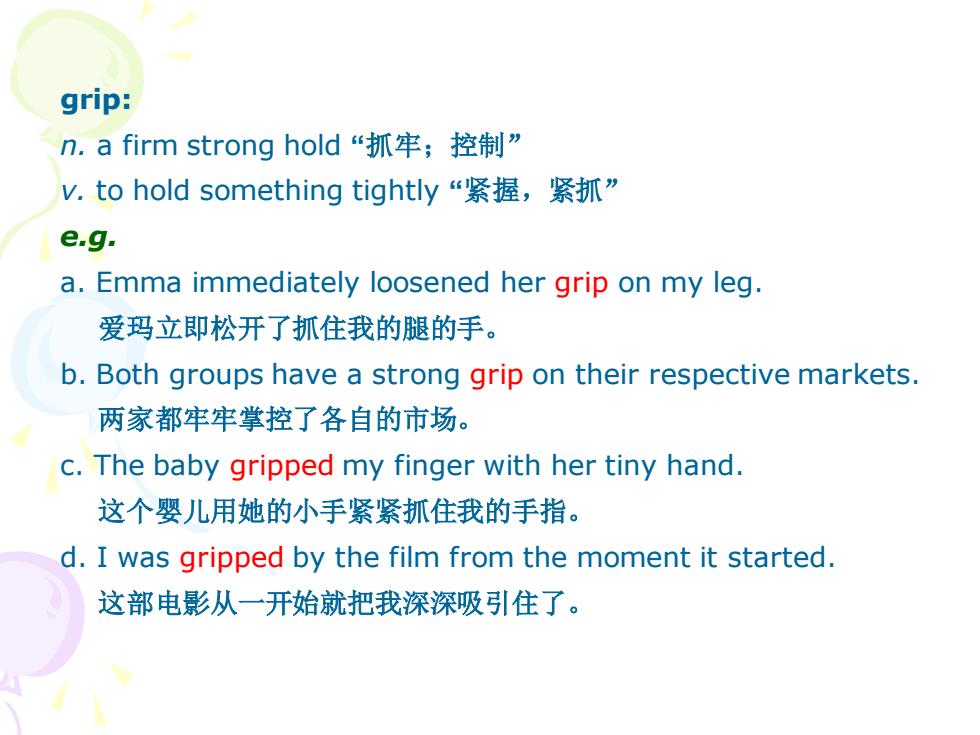
grip: n.a firm strong hold“抓牢;控制” v.to hold something tightly“紧握,紧抓” e.g. a.Emma immediately loosened her grip on my leg. 爱玛立即松开了抓住我的腿的手。 b.Both groups have a strong grip on their respective markets. 两家都牢牢掌控了各自的市场。 c.The baby gripped my finger with her tiny hand. 这个婴儿用她的小手紧紧抓住我的手指。 d.I was gripped by the film from the moment it started. 这部电影从一开始就把我深深吸引住了
grip: n. a firm strong hold “抓牢;控制” v. to hold something tightly “紧握,紧抓” e.g. a. Emma immediately loosened her grip on my leg. 爱玛立即松开了抓住我的腿的手。 b. Both groups have a strong grip on their respective markets. 两家都牢牢掌控了各自的市场。 c. The baby gripped my finger with her tiny hand. 这个婴儿用她的小手紧紧抓住我的手指。 d. I was gripped by the film from the moment it started. 这部电影从一开始就把我深深吸引住了
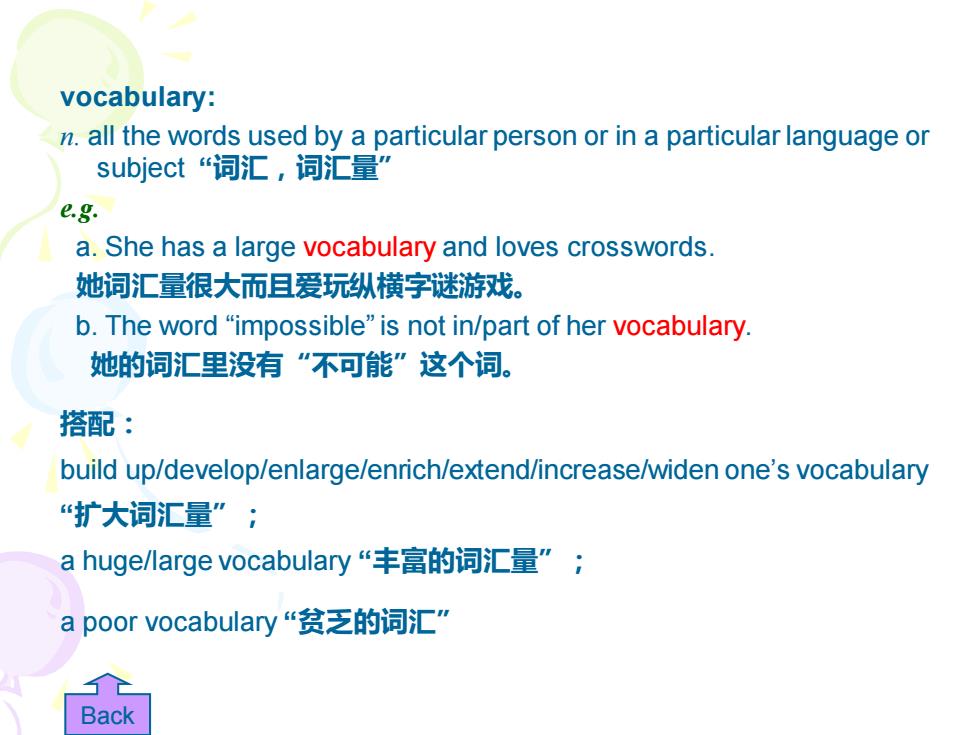
vocabulary: n.all the words used by a particular person or in a particular language or subject“词汇,词汇量” e.g. a.She has a large vocabulary and loves crosswords. 她词汇量很大而且爱玩纵横字谜游戏。 b.The word "impossible"is not in/part of her vocabulary. 她的词汇里没有“不可能”这个词。 搭配: build up/develop/enlarge/enrich/extend/increase/widen one's vocabulary “扩大词汇量”; a huge/large vocabulary“丰富的词汇量”; a poor vocabulary“贫乏的词汇” Back
vocabulary: n. all the words used by a particular person or in a particular language or subject “词汇,词汇量” e.g. a. She has a large vocabulary and loves crosswords. 她词汇量很大而且爱玩纵横字谜游戏。 b. The word “impossible” is not in/part of her vocabulary. 她的词汇里没有“不可能”这个词。 搭配: build up/develop/enlarge/enrich/extend/increase/widen one’s vocabulary “扩大词汇量”; a huge/large vocabulary “丰富的词汇量”; a poor vocabulary “贫乏的词汇” Back

Para.5 2.If it's worth seeing or hearing or doing,I want to see and hear and do it now. 句中t指代值得看、听或做的事。 译文: 如果某件事值得看,听或做,我就会立即付诸行动
2. If it’s worth seeing or hearing or doing, I want to see and hear and do it now. 句中it指代值得看、听或做的事。 Para. 5 译文: 如果某件事值得看,听或做,我就会立即付诸行动
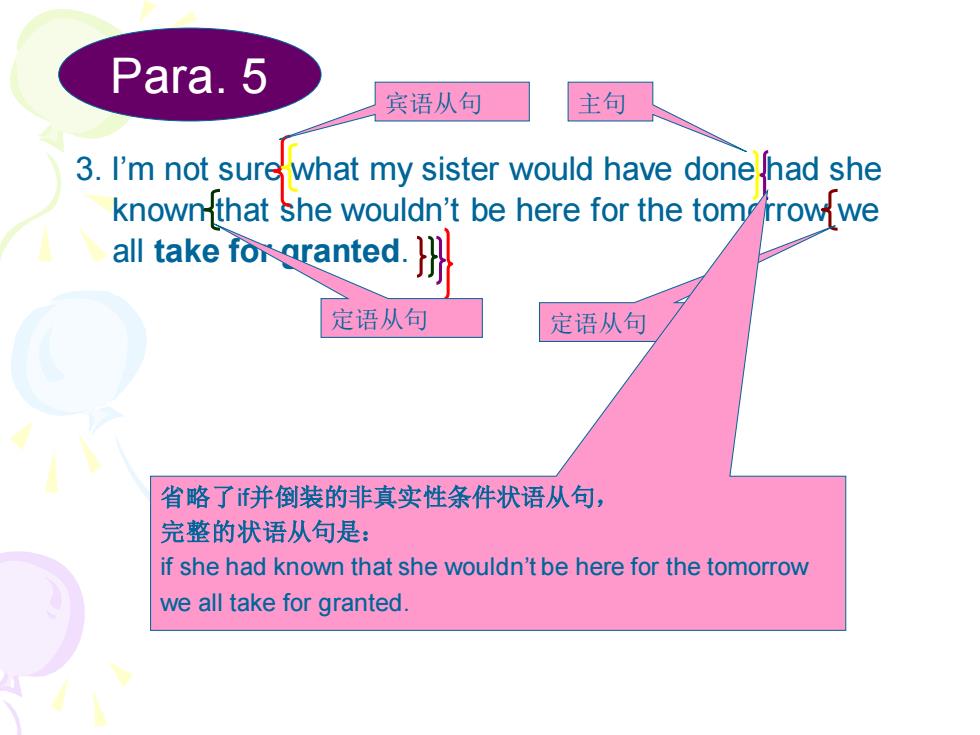
Para.5 宾语从句 主句 3.I'm not sure what my sister would have donehad she known that she wouldn't be here for the tom rrow we all take for aranted. 定语从句 定语从句 省略了并倒装的非真实性条件状语从句, 完整的状语从句是: if she had known that she wouldn't be here for the tomorrow we all take for granted
3. I’m not sure what my sister would have done had she known that she wouldn’t be here for the tomorrow we all take for granted. Para. 5 宾语从句 主句 定语从句 定语从句 省略了if并倒装的非真实性条件状语从句, 完整的状语从句是: if she had known that she wouldn’t be here for the tomorrow we all take for granted
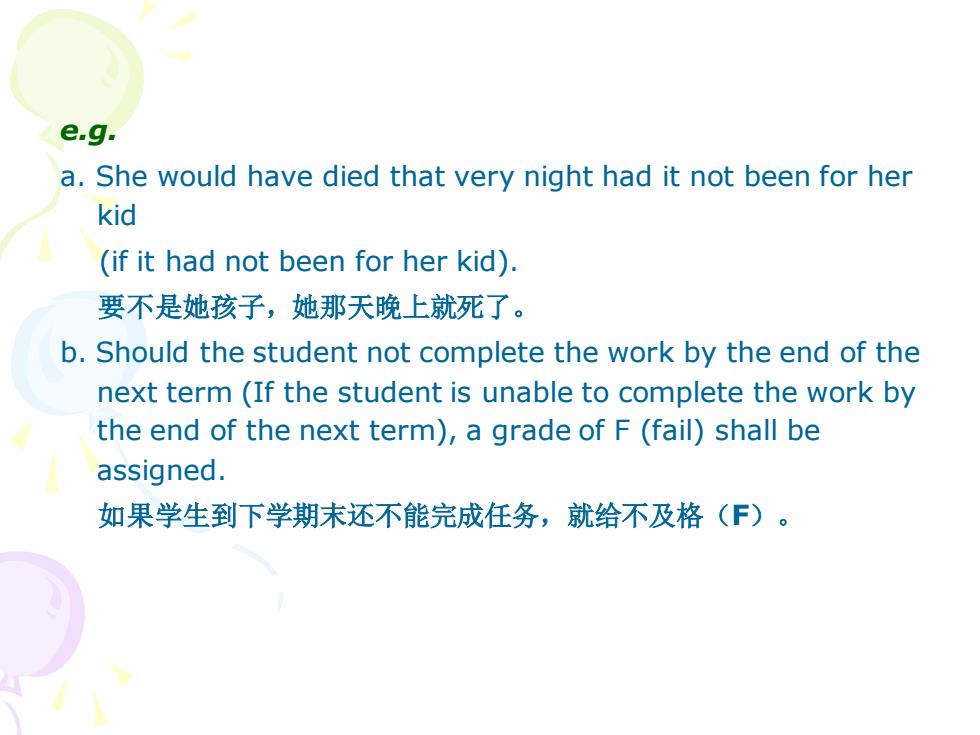
e.g. a.She would have died that very night had it not been for her kid (if it had not been for her kid) 要不是她孩子,她那天晚上就死了。 b.Should the student not complete the work by the end of the next term(If the student is unable to complete the work by the end of the next term),a grade of F(fail)shall be assigned. 如果学生到下学期末还不能完成任务,就给不及格(F)
e.g. a. She would have died that very night had it not been for her kid (if it had not been for her kid). 要不是她孩子,她那天晚上就死了。 b. Should the student not complete the work by the end of the next term (If the student is unable to complete the work by the end of the next term), a grade of F (fail) shall be assigned. 如果学生到下学期末还不能完成任务,就给不及格(F)
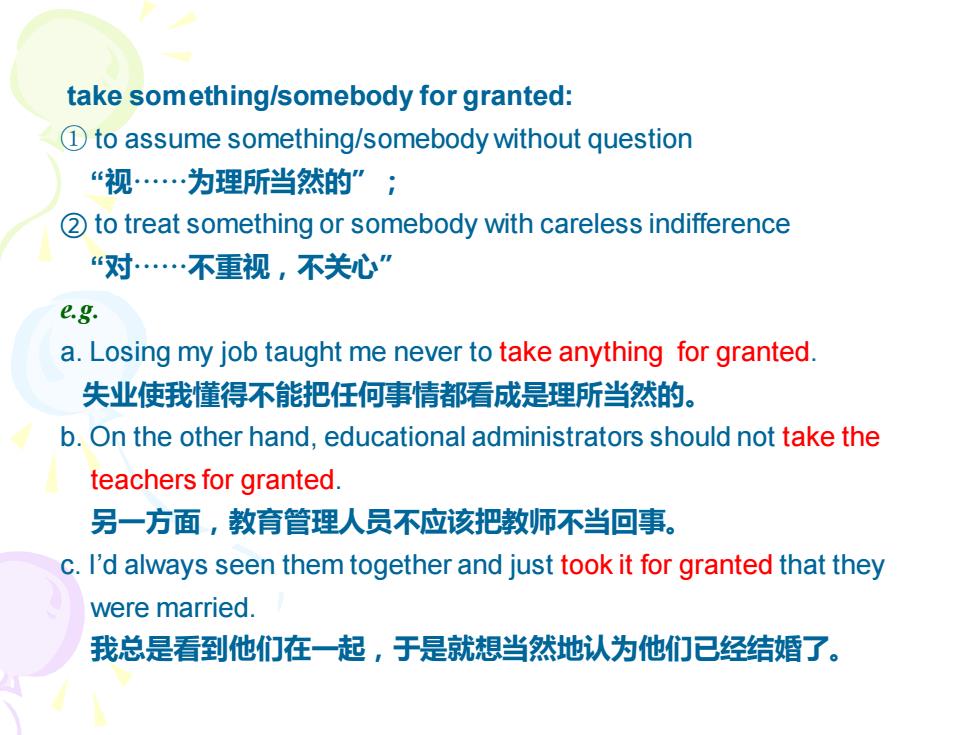
take something/somebody for granted: 1 to assume something/somebody without question “视…为理所当然的”; 2 to treat something or somebody with careless indifference “对……不重视,不关心 e.g. a.Losing my job taught me never to take anything for granted. 失业使我懂得不能把任何事情都看成是理所当然的。 b.On the other hand,educational administrators should not take the teachers for granted. 另一方面,教育管理人员不应该把教师不当回事。 c.I'd always seen them together and just took it for granted that they were married. 我总是看到他们在一起,于是就想当然地认为他们已经结婚了
take something/somebody for granted: ① to assume something/somebody without question “视······为理所当然的”; ② to treat something or somebody with careless indifference “对······不重视,不关心” e.g. a. Losing my job taught me never to take anything for granted. 失业使我懂得不能把任何事情都看成是理所当然的。 b. On the other hand, educational administrators should not take the teachers for granted. 另一方面,教育管理人员不应该把教师不当回事。 c. I’d always seen them together and just took it for granted that they were married. 我总是看到他们在一起,于是就想当然地认为他们已经结婚了
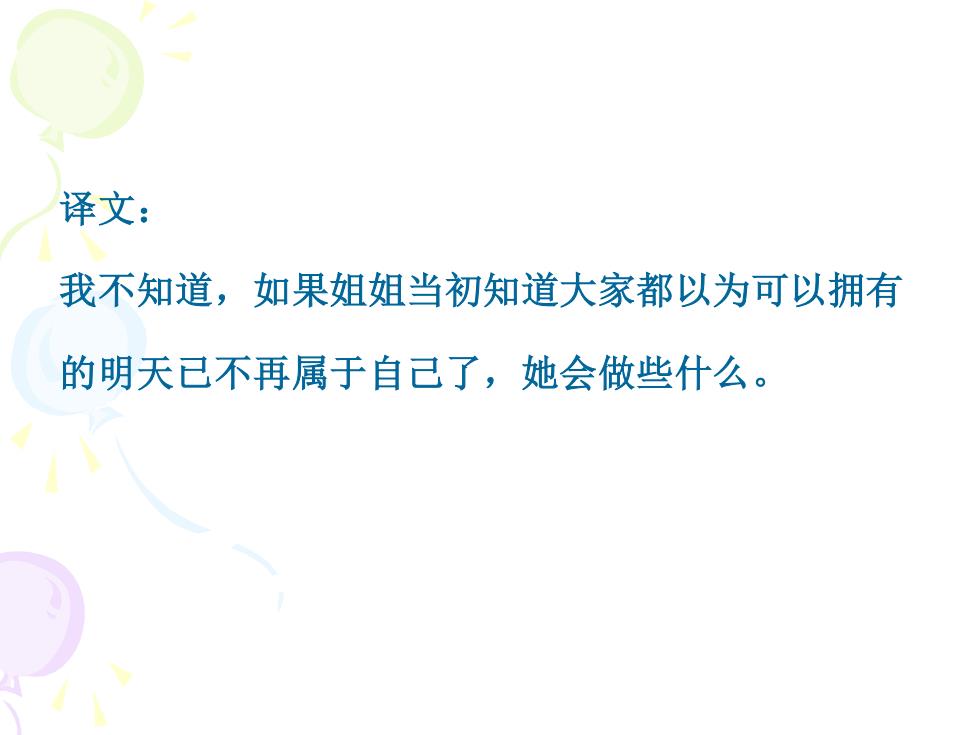
译文: 我不知道,如果姐姐当初知道大家都以为可以拥有 的明天已不再属于自己了,她会做些什么
译文: 我不知道,如果姐姐当初知道大家都以为可以拥有 的明天已不再属于自己了,她会做些什么

Para.5 4.I think she would have called family members and a few close friends.She might have called a few former friends to apologize and mend fences for past squabbles.I like to think she would have gone out for a Chinese dinner,her favorite foodguessing-I'll never know. 情态动词+have done(现在完成时) “也许”,“可能” squabble:n.争吵,口角 译文: 我猜她会给家人和几个好友打电话。也许会给以前的朋友打电话, 为过去因鸡毛蒜皮的事引起的争吵道款并重归于好。我想她会去吃 她最喜欢的中国菜。但这只是我的猜测一一我永远也不会知道了
4. I think she would have called family members and a few close friends. She might have called a few former friends to apologize and mend fences for past squabbles. I like to think she would have gone out for a Chinese dinner, her favorite food. I’m guessing—I’ll never know. Para. 5 squabble: n. 争吵,口角 情态动词+have done (现在完成时) “也许”,“可能” 译文: 我猜她会给家人和几个好友打电话。也许会给以前的朋友打电话, 为过去因鸡毛蒜皮的事引起的争吵道歉并重归于好。我想她会去吃 她最喜欢的中国菜。但这只是我的猜测——我永远也不会知道了